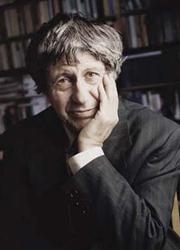Czech writer Ivan Klima, "whose survival of two totalitarian regimes--one Nazi, the other communist--made him one of Eastern Europe's most perceptive distillers of the human condition under authoritarianism," died October 4, the New York Times reported. He was 94.
 |
|
| Ivan Klima | |
The author of more than 40 books, Klima was deeply affected by his incarceration as a boy, from 1941 to 1945, by the Nazis at Terezin concentration camp north of Prague. He lived with the daily prospect of being transported to Auschwitz. The Times noted, however, that his writing "dwelled most heavily on the communist era, including the aftermath of the Prague Spring in 1968, a period of relative freedom when he and other intellectuals supported the reformist efforts of the leader Alexander Dubček, who hoped to create a 'Socialism with a human face' in Czechoslovakia. Their optimism was thwarted when the Soviets sent an estimated 750,000 Warsaw Pact troops to suppress the Prague reforms later that year."
After Klima returned to Prague in 1970 from a sabbatical in the U.S., he became a publisher of underground texts, smuggling some to Western publishers. He also organized a clandestine literary salon, attended by other dissident writers, including playwright and future president Vaclav Havel.
"Ivan Klima is one of the greatest Czech writers and, having experienced concentration camps and the communist period, is a walking symbol of what our country endured in this century," said Jiri Pehe, director of New York University in Prague. "He was more than a literary figure, he played a crucial role in publishing banned works and challenging the communist regime."
As a dissident, Klima had to take menial jobs, an experience he later turned into the story collection My Golden Trades. Some of the stories were published in "samizdat" copies and circulated in Prague.
After the fall of the Communist regime in 1989, Klima "depicted the lives of those who had obediently served the dictatorship, only to find themselves adrift and lost amid the newfound freedoms of a newly democratic country," the Times noted. His books My Merry Mornings and Love and Garbage were rushed into print and sold more than 100,000 copies each. His work has since been translated into dozens of languages.
After graduating from Charles University in Prague in 1956, Klima worked at a publishing house for five years. His first novel, An Hour of Silence, was published in 1963. He was editor of Literarni Noviny, the leading publication of the liberal communist intellectuals, from 1964 to 1967, when he switched to Literarni List.
In 1967, he "greeted the annual assembly of the Czechoslovak Literary Association with the words 'respected friends,' rather than the customary 'comrades,' as he called for elimination of censorship," the Times wrote. Two months later, he was expelled from the Party and barred from publishing, a ban that lasted until 1989. Judge on Trial was written during his 20 years of enforced silence. Completed in 1986 and distributed underground, it was not published until 1991.
After 1989, Klima withdrew from public life and focused for the next 20 years on his writing, including a two-volume memoir, My Crazy Century, which journalist and author Paul Berman described in the Times as having "a bellowing anger at what has happened to many millions of people, himself included, victims of the serial horrors that used to be known, and maybe still are known, as totalitarianism."

